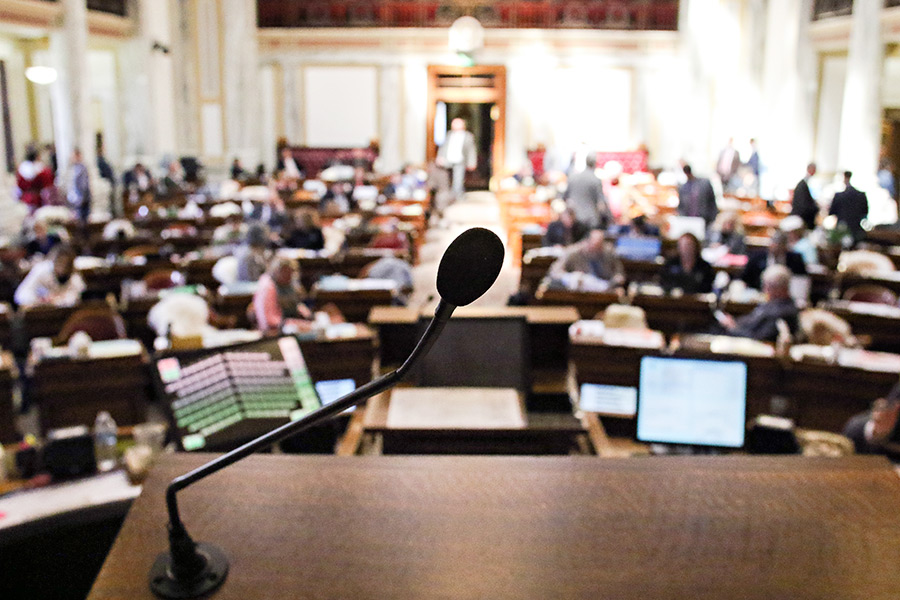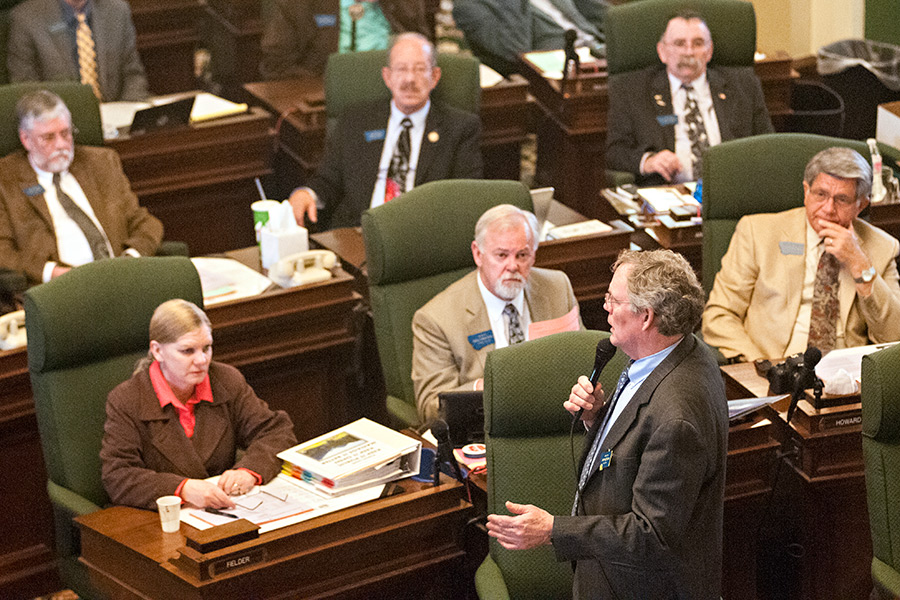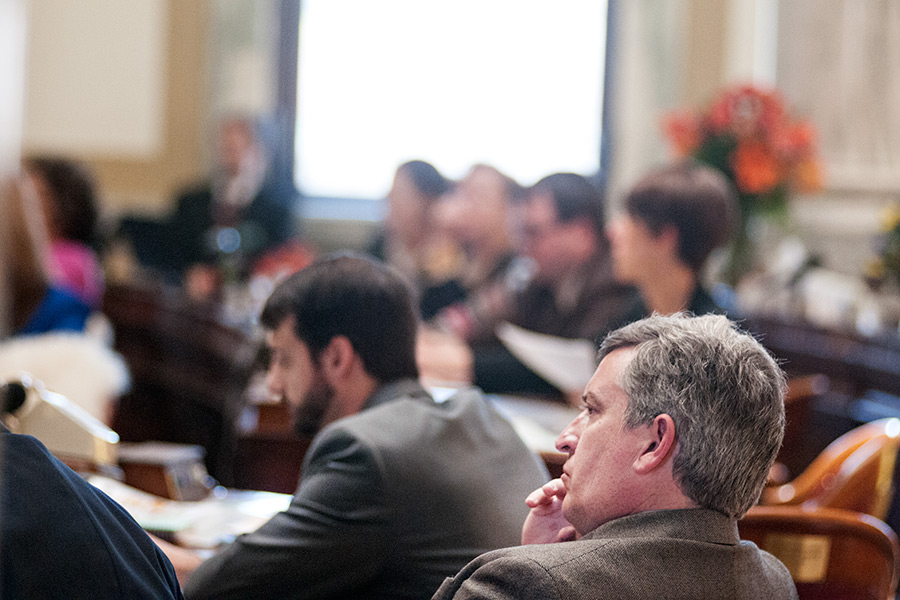After Notching Historic GOP Gains, Montana Lawmakers Lay Out Legislative Priorities
Having secured supermajorities in both the state House and Senate, Montana’s Republican Party has reached the peak of its powers — but it still must coalesce on how to wield them, especially as lawmakers face a $1.5 billion budget surplus
By Tristan Scott
Media consumers have no doubt heard by now about the “red wave that never materialized” in national congressional districts, but as is often the case in Montana, the narrative arc didn’t quite bend along those same lines here.
Not only did last week’s midterm elections deliver Republican wins in both of Montana’s newly drawn U.S. House seats, but the GOP maintained control of the state Legislature after gaining supermajorities in both chambers — an unprecedented feat under the state’s current legislative makeup of 100 representatives and 50 senators.
According to Kyle Schmauch, communications director for the Senate majority, the Republican party’s previous record of power has held at 99 seats since 1997, while the Democrats’ biggest total was 97 seats in 1975. The GOP’s previous record in each chamber was 68 House Republicans in 2011 and 34 Senate Republicans in 1997.
As of Nov. 14, when the Beacon went to press and the newly minted members of the 68th Montana Legislature were preparing to convene in Helena to determine leadership roles and committee assignments, voters had elected 34 Republicans to serve in the Senate, matching the previous record, and 69 Republicans in the House, beating the old record, for a total of 103 Republican legislators.
“Voters spoke loudly and clearly that they want Republican lawmakers to build on the historic successes of the last legislative session and they’re excited to get to work,” Schmauch said in an email.
That excitement is buoyed by the fact that a Republican occupies the governor’s mansion, a feat that eluded the state’s conservative party from 2004 until 2020, when voters elected Greg Gianforte as their executive leader. With all that in mind, Montana’s Republican Party has likely reached the peak of its powers, but it still must coalesce on how to wield them, especially as lawmakers face a projected $1.5 billion budget surplus and the state GOP continues to legislate from across intraparty divisions.
“It’s not exactly inside-the-dugout news that the Republican caucus is split in Montana and I’m anticipating more infighting,” said Rep. Bob Keenan, R-Bigfork, whose 18 years of combined legislative experience crowns him the unofficial “Dean of the Montana Legislature.”

As he prepares to rejoin the House this upcoming session, having reached term limits in the Senate for the second time in his career as a lawmaker, Keenan predicts that a gulf separating Republican hard-liners from the so-called “Conservative Solutions Caucus” will continue to widen, and that infighting will creep into negotiations on a range of issues, from tax relief to parsing Montana’s budget surplus to stabilizing its public psychiatric hospital.
“Even though I’ve got a resume, and I am the Dean of the Legislature, that means nothing these days,” Keenan told the Beacon last week as he prepared to oversee the proceedings in Helena, including the selection of House Speaker, the political and parliamentary leader of that chamber, which multiple sources said would fall to either Rep. Matt Regier, R-Kalispell, or Casey Knudsen, R-Malta.
For Keenan, a longtime business owner who last session served as the state Senate president pro tempore, his legislative enthusiasm is flagging somewhat as he prepares to head back to the House, which he characterized as the more hostile chamber, predicting that his wonkish talents in finance and his expertise and interest in human-health services could languish.
“The House is more of a rodeo and the Senate is more of a cocktail party. But in both chambers, there are enough lawmakers taking their marching orders from the [Solutions Caucus] that it will get contentious. And there’s a lot at stake,” Keenan said, predicting that the leaders of that caucus will receive an outsized balance of power through committee delegations. “I expect [Rep.] Llew [Jones, the defacto leader of the Solutions Caucus] is going to be chairman of a powerhouse committee like Appropriations and his acolytes are going to read the gospel according to Llew. If that’s the lineup, there’s no reason to even have budget subcommittees because the whole deal will be finalized in March. The Senate seems to be the clearinghouse for the budget, so for me going back to the House, where between 30 and 35 members are going to be new, I have a feeling that I’ll be sitting there for four months wondering, ‘Why did I even run?’”
Despite his partisan jabs at Jones and his diminished passion for party unification, Keenan represents an old-school brand of conservative independence, and he’s difficult to peg down along party lines. Characterizing himself as a “maverick,” Keenan says corrections, education and mental health are top priorities, as is determining how to best allocate a budget surplus that could balloon to $2 billion.
“Everybody is going to have a bill to spend some money, so I appreciate what the governor said about paying down state debt,” Keenan said, referring to Gianforte’s budget proposal that includes $1 billion in income and property tax cuts. “And I think a lot of people are going to support giving some of that money back to the taxpayers, but in the Flathead Valley, do we really want to rebate property taxes to people who have bought property in Montana in the past two years? Is that who we want to give a break to on property taxes? Maybe we can carve out a way to give people a break who have owned their property for more than three years. I think that’s going to be a big part of the discussion.”
Keenan also said the governor’s proposal to slash the income tax from 6.5% to 5.9% makes him uneasy in Montana, which he views as an anomaly compared to other intermountain states like Colorado and Utah, where income tax cuts are justifiable amid more densely populated regions that keep services more affordable.
“I’m a little nervous about the governor planting his sword in the ground wanting to cut income taxes because it looks like a rich guy wanting to take care of his friends,” Keenan said. “We can’t compare ourselves to Colorado or Utah, because like any collection of people anywhere, Montanans want services, and they want free services. But services cost money, and when you have an economy of scale, like in Colorado and Utah, you can provide services in an economically efficient manner. In Montana, you have a huge state with only a million people who want the same services, but our economy of scale just doesn’t work out the same way.
In Montana, the unusual surplus is due to an influx of federal dollars during the pandemic, which also resulted in higher-than-expected income tax collections. Last summer, an effort by some Republicans to call a special session of the Montana Legislature to discuss returning excess tax revenue to residents failed, and the Legislature’s members must now decide how to allocate the money.
Keenan hopes to see some of the money used to shore up the state’s behavioral health care system, including investments in the Montana State Hospital in Warm Springs. He’s also a proponent of replenishing the state’s rainy day reserve account and its firefighting reserve fund.
Rep. Frank Garner, R-Kalispell, who is termed out of the House and took a pass on a Senate run this election cycle in favor of spending more time with family, said the Legislature is currently facing “a good problem to have.”
“I wish I’d have been in a session where we had to come up with a solution of what to do with a billion-and-a-half-dollar surplus,” Garner said. “At the same time, I think only about every argument imaginable will creep into this session’s discussions about what to do with that money.”
Still, Garner foresees a raft of social issues and constitutional referendums drifting before the Montana Legislature, where GOP supermajorities could give the party more leeway as it seeks to put ideological measures on the ballot, including restrictions to abortion access.

“I think the social issues and the constitutional referendum are going to be a topic this session. They are every session. I mean, they certainly were last time,” Garner said. “I think the important thing to remember is that regardless of those measures – and keep in mind that Republicans don’t vote as a monolithic bloc – but regardless of those measures, nothing will change unless a majority of people decide it should change. The Legislature can’t unilaterally change the Constitution, they can only give the citizens the opportunity to consider. And while I support the Constitution as a document, it’s ink on paper. It didn’t come out of a burning bush. It’s the people of the state who will decode how that document should serve them.”
For Rep. Dave Fern, D-Whitefish, who is preparing to enter his third term in the Montana Legislature with the distinction as the lone Democrat from the Flathead Valley, the “red wave” materialized in earnest, but it was tempered by the success of incumbent Montana Supreme Court Justice Ingrid Gustafson, who won a hard-fought battle in a non-partisan race that received unprecedented partisan backing this midterm, as well as the defeat of LR-131, the so-called “born-alive” referendum that carried a government mandate criminalizing medical providers charged with caring for infants at any stage of development.
“I think there was sort of a red wave in Montana and the results reflect it by delivering a GOP supermajority, despite the fact that there were five very close House races,” Fern said. “But I guess one has to sit back and accept that, when you take the partisanship out, and you evaluate the key Supreme Court race on the ballot, or you look at the born-alive initiative that was kind of a litmus test for how voters will respond to restricted abortion access, you see somewhat of a contrarian result, which I think is healthy. It just seems obvious to me that the Democratic Party’s brand is not reaching a majority of Montanans in a positive way. That’s up to me and the Democratic Party to figure out policy that works better for more of the working-class population. We need people in agriculture feeling just as good about our party as the people who favor progressive social issues. And that’s where the policymaking will be key.”

Sen. Dan Salomon, R-Ronan, another stalwart in the “Solutions Caucus” wing of the Montana GOP who is entering his seventh session, said he hopes the Legislature doesn’t get too distracted by a flurry of social issues and legislative referenda, which tend to generate divisions that are difficult to overcome.
“I think we’ve all learned our lesson that social issues bring more of a split, but nobody knows what will happen once people start introducing the 2,500 bills we see each session?” Salomon said. “When you’re elected, you make a promise to vote your constituency, then your conscience and then your caucus, in that order. And there are a lot of good legislators who delve into situations and try to figure out how these bills actually work. It’s not a soundbite, it’s an actual piece of legislation. Everyone represents a different district with different makeups, but they all represent Montanans. And as the next four months unfold, we all need to ask ourselves – what is in the best interest of Montanans?”
According to Jones, the Conrad Republican who has served in the Legislature since 2005, chairing the powerful Senate Finance and Claims Committee in 2015 and 2017, the Solutions Caucus does seem to have picked up a few more seats heading into the 2023 Legislature, but the party’s newly minted supermajorities don’t necessarily mean that GOP lawmakers will have an unbroken boulevard of green lights as they seek to craft an agenda and build consensus.
“I don’t think it automatically makes it easier. In some cases, it might be more difficult,” Jones said. “Republicans are notoriously opinionated folks and they bring those opinions to Helena, which makes it difficult to [reach consensus]. A few rogue lawmakers can introduce lots of constitutional amendments, but they still need to convince a supermajority of Republicans to vote for them, and we don’t necessarily agree on what a measure should look like. That’s going to cull down a massive number of those prospective amendments, similar to what we saw in LR-131. And just because something is proposed, the voter might not agree.
“I do think there’s a general agreement among the Republicans on fiscal conservatism, but most of the Republicans are themselves just very independent thinkers arriving at different points,” Jones continued. “The fun thing about being a Republican is we all see the world from very different lenses, and melding all those lenses into one clear vision is going to be an interesting challenge. It always is.”